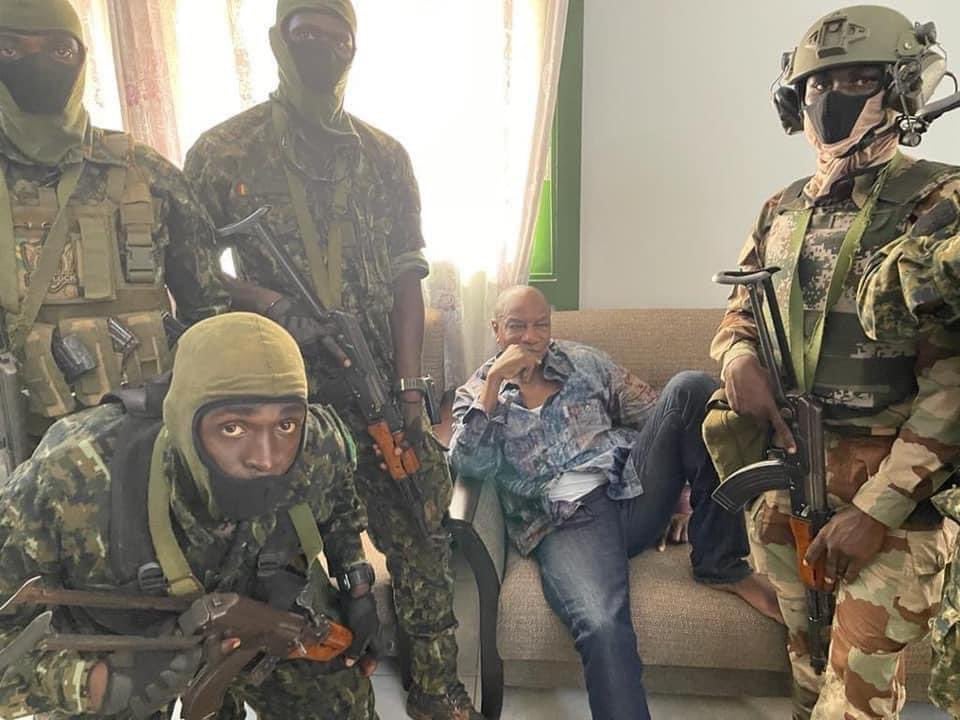Guinea Special Forces Commander Seizes Power In Military Coup
Guinea’s military seized power in a coup on Sunday, announcing that it had detained President Alpha Conde. Following the ousting of the President, the self-styled National Committee for Reunification and Development has announced an indefinite nationwide curfew, alongside a brief closing of the nation’s air and land borders.
The government of Alpha Conde had claimed to have contained an attack on Sunday morning, following reports of gunfire near the presidential palace in the capital of Conakry. However, photographs and video of the president in captivity soon began circulating on social media.
In a Sunday evening broadcast on state television, the head of Guinea’s Special Forces Group, Lieutenant Colonel Mamadi Doumbouya, announced the dissolution of the civilian government and the annulment of the country’s constitution, which he said would be rewritten “together”. Doumbouya cited corruption and government mismanagement as reasons for the coup, saying that “We are no longer going to entrust politics to one man, we are going to entrust politics to the people”, adding that “Guinea is beautiful. We don’t need to rape Guinea anymore, we just need to make love to her”.
In an attempt to placate the mining sector of the nation with the world’s largest reserves of bauxite, the ore refined into aluminum, Doumboya said that the mining industry would be exempt from the curfew, and sea borders would similarly be kept open to facilitate continued exports. However, Reuters reports that aluminium prices reached a 10-year high on Monday, despite the lack of any supply disruptions and an announcement that the borders had been reopened.
Doumboya ordered all civilian ministers and institution leaders to attend a meeting in parliament on Monday, with a statement warning that “any failure to attend will be considered as a rebellion against the CNRD”, using the French initialism for the name of the junta. Despite ordering civilian leaders to not leave the country without permission and to hand over their official vehicles, the lieutenant colonel has claimed that there will not be a “witch-hunt” against them. While Doumboya has announced plans for the formation of a “unity government” and an eventual transition back to civilian rule, he has yet to provide a timeline on when either would happen.
The coup has brought on both regional and international condemnation, with the Economic Community of West African States (ECOWAS) calling for the safeguarding of Conde’s “physical integrity” and the former president’s immediate release. United Nations Secretary General Antonio Guterres also called for Conde’s release, saying that he strongly condemned “any takeover of the government by force of the gun”.
Conde was the first democratically and peacefully elected president of Guinea, being elected in 2010. However, he had been accused of electoral fraud in October 2020 polls, following the passage of a controversial referendum earlier that year that allowed him to sidestep presidential term limits. Following reelection, Conde increased repression of the political opposition, deepening resentment already festering after a bloody crackdown on protests against the referendum. As a result, the BBC’s correspondent in Conakry reports that civilians have welcomed the coup and the apparent end it brought to Conde’s abuses.
Conde had selected Doumbouya to lead the country’s Special Forces Group in 2018, with the former Legionnaire master corporal chosen to guide the group’s efforts against militancy in the region. However, it is believed that Conde had recently sought to use the Special Forces Group as a personal tool to repress the opposition, with the head of Guinea’s Centre for Analysis and Strategic Studies, Mamadou Aliou Barry, saying to Radio France Internationale that he believed that such an attempt had resulted in Doumboya turning on his former commander-in-chief.

